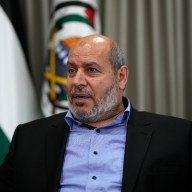School was never a strong point for Toronto’s claim to comedic fame – the irreverent Russell Peters. Yet, the multimillion-dollar grossing comic, whose brazen critiques of ethnicity and class captivate international audiences, finally got a degree.
Well OK, it’s an honorary one. He didn’t have to take any tests to get it, but still.
The School of Creative and Performing Arts at the Humber Institute of Technology and Advanced Learning recently presented him with the honorary degree for his keen observations on race, class and culture, and for his support of young talent. This year, Peters launched a $20,000 scholarship for a student from his former high school, North Peel Secondary, which focuses on technical skills and trades.
Metro caught up with Peters by email and asked him for his thoughts on the award, the importance of education, and his advice for aspiring performing artists.
What did you think when you heard the Humber School of Creative and Performing Arts was giving you an honourary degree?
I thought, “Wow, that’s pretty cool!” But at the same time it’s kind of ironic considering I didn’t go to college and just squeaked through high school.
When you were in school, what did you think you’d be when you grew up?
When I was 14, I wanted to be a breakdancer. That was it, just a breakdancer.
What was the most important lesson you learned in school?
That the cool people in school aren’t the cool people when you’re finished school. The cool crowd becomes the “tool” crowd.
Had your parents chosen a career path for you?
No, they didn’t lay anything out for me. We were very working class, so my parents just wanted me to get a steady job, like a union job or something where there was security.
What did they think of you not going to college? About becoming a comic instead?
They were fine with me not going to college – there was no pressure. They didn’t really understand what becoming a comic meant. I might as well have said that I was going to be an astronaut. They were like, “That’s nice, son…”
You didn’t need higher education to be successful and have a rewarding career, yet you recently developed a scholarship for a high-achieving student planning to go to college. Why do you think education is so important?
For me it wasn’t important. I felt like the system wasn’t really made for kids like me – I had ADD and needed extra help, but the teachers were more focused on the kids who were “getting it,” instead of the kids who weren’t. That all changed when I switched schools and went to North Peel Secondary. That was the first time I felt like I fit in and that the teachers took the time to pay attention to kids like me. I learn something new every day and I know that education is important for most people, it just wasn’t important for me personally.
What is your advice to aspiring performing arts graduates?
Don’t do it because you just want to “make it big.” If you’re going to do it for the money, forget about it. Being a comic or an artist of any kind, you have to do it because you have to. It’s a calling.
















